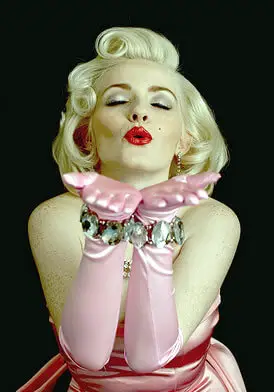A conspicuously attractive but stupid blonde woman.
Dumb blonde
What's the meaning of the phrase 'Dumb blonde'?
What's the origin of the phrase 'Dumb blonde'?
I had it in mind that the expression ‘dumb blonde’ originated in the silent movies of the early days of Hollywood, where female actors like Mary Pickford and Lillian Gish looked on in mute adoration while male heroes saved the day. It didn’t take much thought to realise that this notion made little sense; all the characters in those films were ‘dumb’, not just the women, and neither of the above mentioned were blonde. Nevertheless, my initial guess turns out not to have been too far wide of the mark. The expression was first used, in the USA, in the 1920s.
The ‘stupid’ meaning of the word ‘dumb’ has been more popular in America than in other parts of the English-speaking world, but it was first so used in England. ‘Dumb blonde’ is a disparaging term directed at a woman but the first ‘dumb’ people were men. The expression ‘dumb ox’ long pre-dates ‘dumb blonde’ and was first applied to no less a luminary than the taciturn theologian Saint Thomas Aquinas. This nickname was probably influenced by Aquinas’s quietness and as a corruption of the Latin ‘Dom’ (short for Dominus), a prefix given to religious dignitaries.
By the early 1920s various ‘dumb’ insults became fashionable and ‘dumb ox’ (for men) and ‘dumb bunny’ and ‘dumb Dora’ (for women) were in use in the US college scene. It didn’t take long for wags to come up with ‘dumb belle’ as another.
Here we’ll take a little sideways journey to look at the origin of the word ‘dumbbell’. We now know dumbbells as the hand-held weights used in gyms. Rather an odd word when you think about it, but the following derivation provides the explanation.
When large wheel-mounted peals of bells were introduced into churches in the Middle Ages, it was found that ringing them was quite vigorous exercise. Strength and fitness were as valued then as it is now and people used the bells, with the clappers padded with cloth to stifle the ring, as an early form of fitness machine. They were ‘dumb’ bells, hence ‘dumbbells’.
Back to ‘dumb blondes’… ‘Dumbbells’ wasn’t an entirely pointless tangent as ‘dumb-bell blonde’ was the initial form of ‘dumb blonde’ and ‘dumb-dell Dora’ was the first form of ‘dumb Dora’. Both were found in US newspapers from around the mid-1920s, as in this example from the Iowa Citizen, December 1926:
Many capable, loyal, reliable sweethearts and wives are deserted for the featherweights. Such a woman may be worth her weight in rubies; but if you’re only a mere man you are going to prefer any dumb-bell blonde.
The spread of ‘dumb blonde’ imagery was no doubt influenced by Anita Loos’ popular novel Gentlemen Prefer Blondes, which had been published the previous year, and the description of Jean Harlow as the Blonde Bombshell in her 1933 film, although the phrase ‘dumb blonde’ doesn’t actually occur in either.
Marilyn Monroe may be the stereotypical image of the ‘dumb blonde’ for many people. In fact she was neither dumb nor blonde. Monroe was an astute businesswoman who, capitalising in the fact that 1950s Hollywood really did prefer blondes, turned the brunette Norma Jean Mortenson into a hugely successful commercial asset.
See other phrases that were coined in the USA.
The history of “Dumb blonde” in printed materials
Trend of dumb blonde in printed material over time
Related phrases and meanings
Browse more Phrases
About the Author

Phrases & Meanings
A-Z
A B C D E F G H I J K L M N O P Q R S T UV W XYZ
Categories
American Animals Australian Bible Body Colour Conflict Death Devil Dogs Emotions Euphemism Family Fashion Food French Horses ‘Jack’ Luck Money Military Music Names Nature Nautical Numbers Politics Religion Shakespeare Stupidity Entertainment Weather Women Work
How did we do?
Have you spotted something that needs updated on this page? We review all feedback we receive to ensure that we provide the most accurate and up to date information on phrases.
